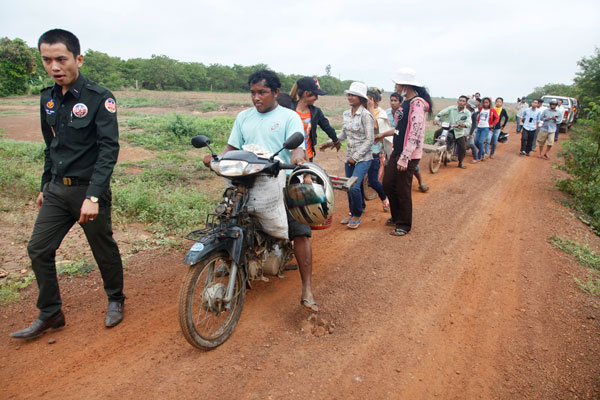Tuesday, 22 May 2012
May Titthara
The Phnom Penh Post
“I experienced Pol Pot’s regime, but it was not as cruel as this. Now that I’ve tasted being handcuffed and bound in the hot daylight, if I had land in another place, I would not live in the area”
Villagers detained during a bloody crackdown in Kratie province last week in which a 14-year-old was shot dead have accused security forces of brutal acts of cruelty, including forcing pregnant women to stand naked in the sun for hours.
The villagers from Pro Ma village in Chhlong district’s Kampong Damrei commune have alleged that military police and police forced men and women to strip naked, handcuffed them and left the females in broad daylight for hours while the males were not freed until the end of the day.
Almost 1,000 police and military police officers stormed the village, where residents have a longstanding land dispute with the company Casotim, at about 8:30am last Wednesday in an operation they said was to arrest the ringleaders of a group attempting to create a mini autonomous state.
Sotheavy, a 19-year-old who requested her real name be concealed, said she had “never seen such brutality” as the violence the forces employed while storming the village of about 1,000 families – which led to the death of 14-year-old Heng Chantha.
“It is so difficult to forget the event. They pointed their guns at me and ordered many women to take their shirt and underwear off, then seized our money and tied our hands behind us and ordered us to stand in broad daylight for two or three hours,” she said.
Sopheap, 63, who also requested her real identity be concealed, said the villagers would file a complaint against the perpetrators.
“I experienced Pol Pot’s regime, but it was not as cruel as this. Now that I’ve tasted being handcuffed and bound in the hot daylight, if I had land in another place, I would not live in the area,” she said.
Kratie provincial governor Sar Chamrong – who took the post on Friday, replacing recently deceased governor Kham Phem – said the forces had only been authorised to search for weapons.
“If the forces hit, harassed and forced people to undress, it is not a policy,” he said.
The operation, ordered by a joint committee of the Ministry of Interior, the national police and the provincial governor, was launched under the pretext that a group called the Democratic Association, led by Bun Ratha, was provoking a separatist movement.
But villagers have repeatedly said Bun Ratha, who evaded arrest along with the four other alleged ringleaders of the group, was merely helping them stand up to the company Casotim.
Eight people have been arrested as a result of the crackdown.
Touch Sok, 52, alleged that during the operation, forces had also confiscated rice and gasoline as well as slaughtered their poultry.
“I seem defeated, but if I am not allowed to live in the area, where can I live to farm and feed myself? I have to return to the area when the situation becomes normal,” he said.
Sar Chamrong said forces had begun pulling out of the area but that some would remain to protect the safety of some 200 families that had lived in the area since 2006.
Others who had migrated to the area from Kampong Cham and other provinces after being tricked by Bun Ratha had been sent home, he said.
But a 2010 Phd thesis suggests their migration there had been economically motivated.
Titled The Geographies of Evasion: The Development Industry and Property Rights Interventions in Early 21st Century Cambodia, the thesis found that significant numbers of migrants, most from Kampong Cham, had moved to Chhlong district after Casotim was awarded a logging concession there and in Snuol district.
Part of the thesis, by Robin Biddulph of Sweden’s University of Gothenburg, examines the impact that Casotim’s 124,000-hectare logging concession, granted in the 1990s, had on the local population.
The thesis found the concession had led to industrial-scale logging in Chhlong and Snuol districts where officials responsible for the forest became “far more ambivalent”.
“Anyone with a tractor or truck that could carry felled trees from the forest to the Mekong was able to pay a fee to Casotim to go into the forests, cut wood, and then sell it to the company. As many as 50 locally owned tractors and trucks participated in this business,” the thesis reads.
Villagers had developed the perception that the military and the Forestry Administration, which had become the equivalent of informal regulators and tax collectors, worked for the concessionaires, the thesis found.
“For the villagers, these soldiers were known simply as the ‘Casotim soldiers’,” it says, referring specifically to the military.
Ly Hout, a representative of Casotim declined to comment yesterday.


























3 comments:
Because they are bandit like their boss.
Please do not destroy Cambodian forest and natural resources which are so important to the good environment. The forests and trees are important to hold and clean water and protect the wild animals or other species.
Those who cut or cleared the forests or trees will be severely punished.
Khmer Yeurng
"the troops has an order for weapons search only and if they did something more than the order, it is not our policy," Kratie Governor as claiming.
Third grader can easily learn to say that, too.
It is not about the policy, idiot and stupid braindead Governor!!!
The point is about turning the blind eyes and condolence of Phnom Penh and provincial top brass like you and others on the troops' inhumane action along the idea that hit them hard and make them swear themselves that they don't want to live in this villages anymore... They did the same things during July 7, 1997 Coup E'tate.
Post a Comment